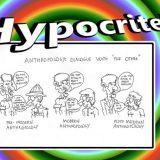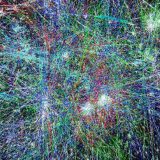Hybridity
The idea of “hybridity” really struck me this week in class. I’ve heard of similar concepts about culture before (although I can’t remember where). Culture isn’t made up of just one singular thing. It is influenced by multiple areas in your life. The two most driving forces designing one’s culture include one’s heritage, and one’s environment. Simultaneously, these two forces continually interact and forming an individual’s cultural identity. A person’s interaction with the environment continuously creates new experiences and memories, adding new pages to one’s history.
Our individual story lies on a continuum. In the early stages of life our family might teach us about our history, where we come from, and teach us how to practice their traditions. These activities instill a feeling of personal identity, and help us to make sense of who we are. As we grow older, we also make connections with the world around us. We meet new people and participate in shared traditions between larger groups of people. We participate in other cultures and draw from them, sometimes with awareness.
In class, we discussed several ideas I’d also like to share my input on. The idea of prosthetic memory was somewhat new to me. I always try to keep context in mind when I gather information from the media. However, I never thought about how mass media might influence our own memories. How can I apply this idea to understand the Vietnamese community in America? How might the American media have shaped the perceptions of refugees about their home country? I saw an example of this phenomenon in Otsuka’s book titled When the Emperor was Divine. After internment the family came back to a different America. One in which the mass media constantly framed all Japanese people (including Japanese Americans) as “the enemy.” In Otsuka’s novel the reader is able to experience only a small fraction of how the Japanese in America were treated post-World War 2.
Another concept, somewhat related to the last, was “collective trauma.” I had read about this concept in some of the research articles I used for my project on Vietnamese refugees last fall. However, when it was brought up in class I found myself re-applying it to everything I had learned since then. I couldn’t help but wonder if this concept can be found in the Vietnamese community in America, now that there are three, four, and perhaps five generations of Vietnamese Americans in the United States.
The last point I would like to bring up in this post, is the relationship between each generation of Japanese Americans that they had with each other. A Japanese person could be referred to based on what generation they were, such as “issei,” “nisei,” and “sansei.” The relationship between 1st, 2nd, and 3rd generations of Japanese Americans seemed familiar to what I understand about Vietnamese Americans as well.
Valverde hinted at both “collective trauma” and “generational relationships” in her book entitled Transnationalizing Viet Nam. The many tensions caused by the war and assimilation into the United States is deeply rooted in the collective memory of many 1st and 2nd Vietnamese Americans. I see many similar views of each other between older and younger generations in both the Japanese American community and the Vietnamese American community. It would be interesting to compare these relationships to other immigrant groups. There are many different reasons why people choose to immigrate to a new country, and perhaps understanding the why and the how can help us find solutions to the forces that we have control over. Not to curb immigration, but to change the negative circumstances that promote it as the only option.
















This is a thought-provoking article on the concept of hybridity! You’ve done an excellent job of exploring how hybridity manifests in various cultural, social, and biological contexts. The discussion on how hybrid identities and elements can lead to new forms of expression and innovation was particularly insightful. I’d be interested to see more examples of hybridity in contemporary society and how it influences global interactions. Great work in shedding light on such a complex and multifaceted topic!
Join the ultimate kart battle with Smash Karts ! Customize your kart, collect awesome weapons, and smash your way to victory.
If you are looking for a highly entertaining game, this is definitely what you need to find, play now and enjoy with your friends!
five nights at freddy’s
gk88 bet bet sân chơi giải trí trực tuyến hàng đầu, đa dạng sản phẩm và đầy hấp dẫn. Chúng tôi mang đến trải nghiệm mượt mà, dịch vụ chuyên nghiệp và bảo mật tuyệt đối. Khám phá ngay gk88 để tận hưởng sự khác biệt.
GK888 da va dang khang dinh vi the la dia chi dang tin cay cho cac tin do ca cuoc tai Viet Nam va quoc te.
The concept of hybridity that you explore in your post resonates with the complexities of cultural identity and the continuous process of adaptation. As you point out, culture is dynamic, shaped by both heritage and environment.
sun52s.com – Nền tảng giải trí trực tuyến hiện đại, cung cấp trải nghiệm đa dạng với công nghệ tiên tiến và giao diện thân thiện.
33wins.store là sự lựa chọn hoàn hảo cho những ai đam mê giải trí trực tuyến, với kho trò chơi phong phú và hệ thống bảo mật an toàn tuyệt đối.
s666a.co – Ưu đãi đặc biệt dành riêng cho thành viên mới: Tham gia ngay S666a.co để nhận hàng loạt phần thưởng hấp dẫn dành cho người dùng mới.
Trải nghiệm trực tuyến hoàn hảo với viralmeister.com, giao diện thân thiện và đội ngũ hỗ trợ khách hàng chuyên nghiệp. Chúng tôi luôn sẵn sàng lắng nghe và giải quyết mọi thắc mắc của bạn.
google:suggestsubtypes, mọi cá cược đều là cơ hội! Với các trận đấu thể thao đỉnh cao, casino sôi động, và tỷ lệ cược hấp dẫn, chúng tôi mang đến cho bạn trải nghiệm không thể nào quên. Hãy gia nhập ngay hôm nay!
Chào mừng bạn đến với onbet88! – Với hệ thống bảo mật chặt chẽ và dịch vụ hỗ trợ 24/7, OnBet cam kết mang lại trải nghiệm cá cược an toàn và thú vị. Hãy gia nhập cộng đồng OnBet và bắt đầu hành trình thắng lớn của bạn ngay bây giờ!
Chào bạn đến với qh88 đăng nhập – Nơi niềm đam mê cá cược được chạm tới! Tại QH88, chúng tôi cung cấp một nền tảng cá cược chất lượng cao, từ các trò chơi casino thú vị đến các sự kiện thể thao sôi động. Với giao diện dễ sử dụng và đội ngũ hỗ trợ tận tình, QH88 cam kết mang đến cho bạn những trải nghiệm cá cược không thể quên!
Chào mừng đến với abc8 , nơi cung cấp những trải nghiệm cá cược trực tuyến đỉnh cao với các trò chơi hấp dẫn và dịch vụ khách hàng chuyên nghiệp.
Doi ngu ho tro khach hang cua five-888.com luon san sang phuc vu 24/7, dam bao moi thac mac duoc giai dap kip thoi. Voi phong cach lam viec chuyen nghiep, nguoi dung luon cam thay hai long. Su tan tam va chu dao la diem manh cua nen tang nay.
Brawl Stars offers thrilling team battles with unique characters, each with powerful abilities. Jump into fast matches and work with your team to defeat opponents and claim victory in every match.
Ra đời với mục tiêu tạo sân chơi đẳng cấp, EV88 không ngừng phát triển và khẳng định vị thế. Kho game phong phú, từ thể thao, casino đến e-sports. Dịch vụ CSKH 24/7 luôn sẵn sàng hỗ trợ. Giao diện thiết kế đẹp mắt, dễ thao tác, mang lại trải nghiệm mượt mà.https://ev88.rocks/
Download Null’s Brawl for free and explore exciting game modes with unlimited gems, gold, and skins. Enjoy enhanced gameplay without spending a penny.
Play Null’s Brawl on a private server and enjoy exclusive features like unlimited gems, unlocked skins, and powerful brawlers. Download now for endless fun.
https://kubet6.dev – Nơi tin cậy để đặt cược và chiến thắng! Tận hưởng một không gian cá cược an toàn, bảo mật và công bằng. Hãy tham gia và nhận ngay những phần thưởng cực kỳ hấp dẫn.
Xin chào, chào mừng bạn đến với R Win! Nơi mang đến cho bạn những trận đấu thể thao đầy kịch tính và các trò chơi sòng bài đẳng cấp. Với giao diện thân thiện và tính bảo mật cao, chúng tôi cam kết mang đến trải nghiệm cá cược an toàn và thú vị cho tất cả người chơi.
Lu888 hiện đang là một trong những nhà cái trực tuyến được cộng đồng người chơi đánh giá cao bởi độ uy tín và chất lượng dịch vụ vượt trội. Với đa dạng các sản phẩm cá cược như thể thao, casino, xổ số và game bài, nhà cái không chỉ mang đến cơ hội giải trí mà còn là nơi giúp người chơi tăng thêm thu nhập mỗi ngày.
Access timeless elegance with vintage jewelry from Kawaiioo, perfect for classic and sophisticated looks.
https://fa888.life/ nơi uy tín trong lĩnh vực cá cược trực tuyến hiện nay tham gia ngay nha để được nhận ngay để cho mình khuyến mãi trải nghiệm.
https://may88.run/ nhà cái hàng đầu châu á trong mọi lĩnh vực game cá cược trực tuyến hiện nay, tham gia ngay để nhận các ưu đãi trải nghiệm nha
https://du88.world/ – Nhà cái cá cược thể thao đẳng cấp số 1 Châu Á, mang đến trải nghiệm bóng đá đỉnh cao với tỷ lệ kèo hấp dẫn, game đổi thưởng đa dạng và giao dịch nhanh chóng, an toàn. Giao diện thân thiện, khuyến mãi cực chất. Đặc biệt: Thưởng thăng cấp lên tới 1.888.888K!
https://ev88z.co/ là nhà cái cá cược trực tuyến đáng tin cậy, cung cấp một loạt các trò chơi hấp dẫn như thể thao, casino, game bài và xổ số. Với hệ thống bảo mật vững chắc, giao diện thân thiện và nhiều khuyến mãi hấp dẫn, EV88 luôn mang đến trải nghiệm giải trí tuyệt vời cho người chơi.
https://tx88be.com/ Nền tảng cá cược uy tín nhất 2025 đang được rất nhiều anh em săn đón và nhiều ưu đâi khủng cho người mới tham gia
https://tibidy.io/ chuyên cung cấp dịch vụ cá cược trực tuyến với giao diện hiện đại, tỷ lệ trả thưởng hấp dẫn, bảo mật cao cùng đội ngũ chăm sóc khách hàng chuyên nghiệp và tận tâm.
https://suncity-sg.com/ là địa điểm giải trí và cá cược trực tuyến uy tín, tích hợp nhiều trò chơi đa dạng và hấp dẫn, mang đến trải nghiệm đẳng cấp và an toàn cao.
https://glasses4less.uk.com/ cung cấp sản phẩm cá cược và giải trí đa dạng, môi trường chơi uy tín với giao diện thân thiện, hỗ trợ khách hàng 24/7 và nhiều khuyến mãi hấp dẫn.
https://theking33.com/ là nền tảng cá cược trực tuyến hàng đầu, cung cấp đa dạng trò chơi và dịch vụ chất lượng, đảm bảo an toàn và trải nghiệm giải trí đẳng cấp cho khách hàng.
https://69vn.work/ nổi bật với tỷ lệ trả thưởng cao, dịch vụ nhanh chóng và hỗ trợ tận tình, mang lại trải nghiệm chơi uy tín và hấp dẫn cho người dùng.
https://aog777.services/ là nền tảng cá cược trực tuyến nổi bật, cung cấp nhiều trò chơi đa dạng từ thể thao. Với giao diện thân thiện và dịch vụ hỗ trợ 24/7, AOG777 mang đến trải nghiệm tuyệt vời cho người chơi.
https://vin88pro.online/ là một trong những nhà cái hàng đầu tại Việt Nam, nổi bật với tỷ lệ trả thưởng cao và nhiều khuyến mãi hấp dẫn. Người chơi có thể tham gia vào nhiều trò chơi thú vị và an toàn.
https://ev88.vegas/ cung cấp dịch vụ cá cược trực tuyến chất lượng, với nhiều trò chơi phong phú và giao diện dễ sử dụng. Đội ngũ hỗ trợ khách hàng tận tình giúp người chơi có trải nghiệm tốt nhất
https://uk88online.com là một nền tảng cá cược trực tuyến nổi tiếng, cung cấp nhiều trò chơi như cá cược thể thao và slot game. Với giao diện thân thiện và dịch vụ khách hàng tận tâm, UK88 thu hút nhiều người chơi.
Rwin là thương hiệu cá cược trực tuyến uy tín, nổi bật với kho game đa dạng, giao diện hiện đại và khuyến mãi hấp dẫn mỗi ngày.
Hướng Dẫn Kbet hướng dẫn cho tất cả anh em tất cả chi tiết tại nhà cái.
https://may88.run/ là nhà cái trực tuyến uy tín, cung cấp đa dạng trò chơi cá cược như thể thao, game bài, slot và xổ số, mang đến trải nghiệm giải trí đỉnh cao cho người chơi.
Fabet – https://fabetcom.com/ mở ra vũ trụ giải trí đa sắc màu – nơi tinh hoa cá cược hội tụ với công nghệ streaming 4K sắc nét, mang đến những trận đấu đá gà cựa dao chân thực như xem trực tiếp tại trường gà. Tại Fabet, mỗi phút giây đều là cuộc phiêu lưu đầy máu lửa, nơi chiến thuật và bản năng người chơi được thử thách đến giới hạn cuối cùng!
https://ok365cv.com/ cam kết minh bạch – uy tín – nhanh chóng trong mọi giao dịch nạp rút và hỗ trợ khách hàng.
https://ww88cv.com/ thu hút hàng triệu thành viên nhờ chính sách khuyến mãi hấp dẫn mỗi tuần.
xổ số tx88 là lựa chọn hàng đầu cho những ai yêu thích lô đề, Keno và các trò chơi xổ số trực tuyến với xác suất trúng thưởng cao
“EV88 Là nhà cái uy tín số 1 Việt Nam, chuyên các game như đá gà, bắn cá, sô xổ, game slot, thể thao và còn rất nhiều thể loại game khác, hãy tham gia để được nhận 88k khi đăng ký chơi
Website: https://ev88network.com/
“
“KBET là trang cá cược uy tín hàng đầu Việt Nam hiện nay, cũng là sân chơi của các giới trẻ có niềm đam mê những bộ môn như thể thao, xổ số, bắn cá
Website: https://kbete.com/
“
“99WIN là trang cá cược uy tin và lớn nhất Việt Nam, mang nhiều thể loại cá cược uy tín mang tầm quốc tế
Website: https://99win.ltd/“
km88dm com – Cổng game cá cược đỉnh cao, hỗ trợ 24/7, nạp rút siêu tốc.
C54 link truy cập chính thức của nhà cái không chặn, truy cập nhanh chóng mượt mà, an toàn bảo mật.
https://mm99.blue/ là nhà cái cá cược trực tuyến uy tín với đa dạng trò chơi và bảo mật cao.
Website: https://eu9.co.in/ là điểm đến được mọi ngươi ở việt nam và cả đông nam á đang đón nhận, khi đến đây bạn sẽ trải nghiệm được các ưu đãi và các trò chơi đỉnh cao.
Five88 .vin cổng game đổi thưởng nhận tiền lớn nhất trong khu vực châu Á. Tên tuổi của chúng tôi đã được minh chứng bởi các chứng nhận hợp pháp, hệ thống game đa dạng và thời gian gian dịch cực nhanh chóng.
Website: https://fiv88.it.com/
C54 C54 nhanh tay đăng ký tài khoản tại đây nhận ngay 88k vào tài khoản.
ip 88 click đăng ký nhận ngay code 88k đến 888k ngẫu nhiên cực hấp dẫn.
Luck8 là nền tảng cá cược và giải trí trực tuyến được đánh giá cao tại khu vực châu Á, đặc biệt nổi bật ở Việt Nam. Ra đời từ khoảng năm 2010–2015 và trực thuộc quản lý của một đơn vị uy tín đặt tại Philippines, nền tảng này không chỉ đầu tư mạnh vào chất lượng trải nghiệm mà còn chú trọng đến yếu tố pháp lý và bảo mật.
https://100vips3.com/ hệ thống được thành lập ra nhầm mục đích liên kết các nhà cái uy tín nhất hiện tại lại với nhau xây dựng hệ sinh thái cá cược lành mạnh cho mọi hội viên. Tham gia ngay để biết thêm các thông tin mới nhất nha.
✔️ nhà cái MM99 Nhà Cái Uy Tín Đáng Trải Nghiệm Nhất Châu Á
https://789fcom.me/ Tương thích di động, điều hướng trực quan, hiệu suất ổn định.
Link chính thức mm99.com luôn an toàn, tránh bị chặn khi tham gia cá cược.
88AA – Nơi khởi đầu cho những cơ hội thắng lớn! Chúng tôi cung cấp nền tảng cá cược an toàn, bảo mật và hỗ trợ người chơi tận tình.
Game bắn cá ở TT88 BANCA30 thực sự hấp dẫn, đồ họa đẹp mắt và dễ trúng thưởng, mang lại cảm giác giải trí rất tuyệt.
K8 luôn cập nhật công nghệ tiên tiến để mang đến trải nghiệm mượt mà, tốc độ truy cập nhanh và hình ảnh sắc nét.
EU9 là nền tảng cá cược trực tuyến uy tín hàng đầu châu Á, cung cấp trải nghiệm giải trí an toàn, minh bạch với giao diện thân thiện, hệ thống bảo mật hiện đại và dịch vụ chăm sóc khách hàng 24/7. Truy cập ngay: https://fitnessband.de.com/
Tôi rất thích tính minh bạch của k8bet đăng nhập. Mỗi giao dịch đều được xác nhận nhanh và có thông báo rõ ràng.
Giao dịch nạp rút tại 18win12 nhanh chóng chỉ trong vài phút. Thử ngay tại 18win12.cn.com để cảm nhận sự chuyên nghiệp. Đây là lý do nhiều bet thủ yêu thích thương hiệu này.
https://df999ze.cn.com/ – nạp rút siêu tốc, nhiều phương thức linh hoạt, đảm bảo minh bạch và chính xác.
https://sv66team.cn.com/dang-ky-sv66/ – hướng dẫn đăng ký tài khoản nhanh gọn, vài bước đơn giản để bắt đầu chơi an toàn.
Tôi đã tham gia trải nghiệm tại 23win.com và cảm thấy rất hài lòng. Giao diện mượt mà, dễ sử dụng giúp tôi thao tác nhanh chóng. Các trò chơi cũng được cập nhật thường xuyên, mang lại sự hứng thú cho người chơi.
Rất hài lòng với dịch vụ chăm sóc khách hàng của mm99.global, luôn hỗ trợ tận tâm khi mình cần.
ank khẩu dâm số 1➡
mne đụ với đĩ thõa➡
DF999 – nơi hội tụ hàng nghìn tựa game đổi thưởng hấp dẫn, từ thể thao, casino đến slot hiện đại.
Explorez Null’s Brawl – le serveur où chaque joueur devient un champion. Gagnez des récompenses instantanées et testez les derniers brawlers mythiques.
jun88 tao là seo bên MB66
https://seventhwave.uk.com/ – An ninh vững chắc, chất lượng hàng đầu.
https://seventhwave.uk.com/ – Công nghệ mã hóa tiên tiến, an toàn từng phút giây.
Thanks for this Article.
Thông tin 100vip liên tục cập nhật tại https://mobilerockers.in.net/.
Chính Sách Hoàn Trả 5MB ổn định giúp người chơi yên tâm tham gia hiệu.
Cá cược HM88 tại https://hm88jqk.in.net/ – bảo mật AES-256, giao dịch nhanh và hỗ trợ 24/7.
Đăng nhập 88xx qua https://88xx88.in.net/ để nhận thưởng chào mừng và tham gia cá cược thể thao hấp dẫn.
https://88vv88.in.net/ mang đến trải nghiệm cá cược ổn định, tốc độ nhanh và dịch vụ hỗ trợ 24/7.
Cá cược bóng đá và casino trực tuyến tại https://888new.in.net/ với hệ thống bảo mật mạnh, tốc độ truy cập nhanh.
https://5mb55.in.net/ là cổng truy cập chính thức của 5MB, cung cấp hàng trăm game casino, slot và bắn cá hấp dẫn.
Nổ hũ vipwin app tiện lợi, chỉ cần một chạm là quay, tiền thưởng cộng trực tiếp vào ví game.
Laman spgatmlogin.my menawarkan sokongan SPG ATM Login Malaysia yang mesra pengguna, memastikan akses akaun lebih selamat, cepat, dan mudah difahami semua golongan.
Nhà Cái Uy Tín– SDAB-261
Nhà Cái Uy Tín– Yu Shinoda
XX88 thủ thuật qua mặt google
Achieve your migration goals with Skilled visa Australia services from Visa Connect. Our knowledgeable team provides step by step guidance, helping you understand requirements, prepare strong applications, and navigate complex visa pathways. Move forward with expert support and confidence. Speak with Visa Connect today and start building your future in Australia.
Barakah Mortgage is a trusted Islamic home financing partner offering Sharia-compliant, halal mortgage solutions for new home buyers, first-time buyers, and refinancing. Serving Houston and beyond, Barakah helps customers understand how to choose a mortgage lender, get pre-approved, and secure an Islamic mortgage loan. Qualified borrowers may receive a Same Day Mortgage approval, subject to underwriting, documentation, and eligibility requirements.
Maintenance Mental Health provides confidential online therapy that meets you where you are. As a Licensed Mental Health Counselor, we offer individual and couples counseling for anxiety, depression, stress, life transitions, and maternal mental health. Our virtual therapy services focus on emotional insight, resilience, and sustainable personal growth beyond crisis moments.